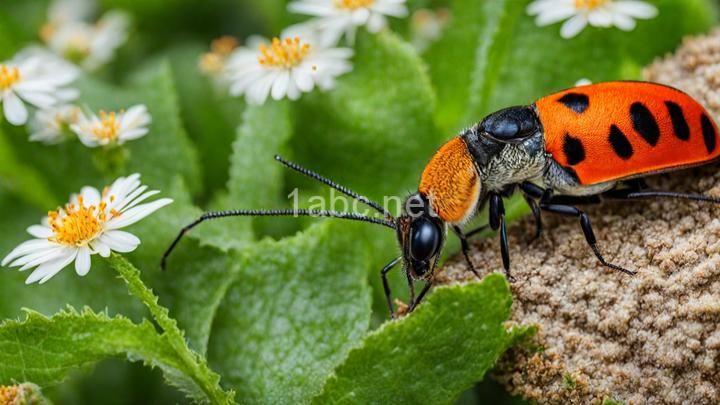The Pros and Cons of Natural Pest Control Methods for Home and Garden

Introduction:
Welcome to today's blog post, where we will be exploring the world of natural pest control methods for your home and garden. In recent years, there has been a growing interest in finding alternative ways to deal with pests without relying on chemical pesticides. In this blog, we will delve into the pros and cons of using natural methods for pest control, providing you with a comprehensive understanding of the topic.
I. What are Natural Pest Control Methods?
Before we dive into the benefits and drawbacks of natural pest control, let's first establish what exactly we mean by this term. Natural pest control methods involve the use of organic, non-toxic substances or environmentally-friendly practices to combat pests in your home or garden. These methods can range from companion planting to biological controls, physical barriers, and even homemade remedies. The beauty of natural pest control lies in its ability to address pest issues while minimizing harm to the environment and promoting sustainability.
II. The Pros of Natural Pest Control Methods:
A. Environmental Benefits:
One of the most compelling reasons to consider natural pest control methods is their positive impact on the environment. Unlike chemical pesticides, which can contribute to pollution and harm beneficial insects, natural methods offer a safer alternative. By utilizing organic and non-toxic substances, we can reduce the negative impact on our ecosystems, preserving biodiversity and maintaining a healthy balance in our natural surroundings.
B. Health Benefits:
In addition to the environmental benefits, natural pest control methods also offer significant advantages for human and pet health. Chemical pesticides often contain harmful toxins that can be harmful if ingested or come into contact with the skin. By opting for natural alternatives, we can minimize our exposure to these harmful chemicals, creating a safer environment for ourselves and our furry friends. Furthermore, natural pest control methods can contribute to a healthier indoor environment by avoiding toxic residues that may linger long after the pests have been eliminated.
C. Cost-effectiveness:
Another advantage of natural pest control methods is their cost-effectiveness. Many of these methods can be implemented using inexpensive or readily available materials, making them accessible to a wide range of individuals. By utilizing items you already have or can easily obtain, you can save money in the long run compared to purchasing commercial pesticides regularly. Natural pest control not only benefits your wallet but also empowers you to take control of your home and garden without breaking the bank.
III. The Cons of Natural Pest Control Methods:
While the benefits of natural pest control methods are numerous, it is essential to acknowledge the potential drawbacks as well. Understanding these challenges will help you make informed decisions and manage your expectations effectively.
A. Limited Effectiveness:
One of the main drawbacks of natural pest control methods is their limited effectiveness, especially when dealing with severe infestations. While chemical pesticides often provide immediate and potent results, natural methods may require more time and patience to achieve the desired outcome. It is crucial to properly identify the pests you are dealing with and choose appropriate strategies accordingly. Natural pest control is most effective when used as a preventive measure or in combination with other techniques.
B. Time-consuming Nature:
Another aspect to consider is the time and effort required for natural pest control methods. Unlike simply spraying chemicals, some natural methods demand more involvement and dedication. For example, companion planting requires careful planning and ongoing maintenance. However, there are ways to make these methods more manageable. Starting small and involving family members can help distribute the workload and turn pest control into a fun and rewarding activity.
C. Trial-and-error Process:
Lastly, it is important to remember that finding the right combination of natural pest control techniques often involves a trial-and-error process. What works for one person's garden may not necessarily work for another's. It is crucial not to get discouraged if your initial attempts are not immediately successful. Embrace the learning curve and be open to experimenting with different techniques and approaches until you find what works best for your home and garden.
IV.
Conclusion:
In conclusion, natural pest control methods offer a wealth of benefits for your home and garden. From environmental advantages to improved health and cost-effectiveness, they present a compelling alternative to chemical pesticides. However, it is important to be aware of their limitations as well. Natural methods may not be as potent for severe infestations, require more time and effort, and involve a trial-and-error process. By being patient, persistent, and open to experimentation, you can find the natural pest control approach that works best for you. So, embrace the journey, and let's create a pest-free environment together!
FREQUENTLY ASKED QUESTIONS
What are natural pest control methods?
Natural pest control methods are ways to manage and eliminate pests without the use of synthetic chemicals or harmful substances. These methods focus on utilizing natural solutions and techniques to deter, repel, or eliminate pests in a safe and eco-friendly manner. Some common natural pest control methods include:
-
Biological controls: This involves introducing natural predators, such as ladybugs or nematodes, to the affected area to prey on pests and keep their population in check.
-
Companion planting: By strategically planting certain plants together, you can create a natural barrier against pests. For example, marigolds can repel aphids, while basil can deter mosquitoes.
-
Physical barriers: Installing physical barriers like nets, fences, or screens can prevent pests from accessing your plants or entering your home. These barriers act as a protective shield, keeping pests at bay.
-
Traps and baits: Using traps and baits made from natural materials can help capture and control pests. For instance, sticky traps can catch flying insects, while beer traps attract and trap slugs.
-
Organic insecticides: Organic insecticides derived from natural sources, like neem oil or pyrethrum, can be used to control pests. These products are less harmful to the environment and pose minimal risks to humans and beneficial insects.
It's important to note that natural pest control methods may require more patience and consistency compared to chemical-based alternatives. While they may not provide instant results, they offer a safer and more sustainable approach to managing pests.
What are the advantages of using natural pest control methods?
Using natural pest control methods has several advantages. First and foremost, it is safer for you, your family, and your pets. Unlike chemical pesticides, natural pest control methods do not contain harmful toxins that can pose a risk to your health. By opting for natural alternatives, you can effectively address pest issues without compromising your well-being.Another advantage of natural pest control methods is that they are environmentally friendly. Chemical pesticides can contaminate soil, water sources, and harm beneficial insects and wildlife. On the other hand, natural methods work in harmony with nature, targeting pests while minimizing harm to the ecosystem.
Natural pest control methods are also sustainable in the long run. Chemical pesticides can lead to the development of resistant pests, requiring stronger and more toxic chemicals over time. Natural methods, such as biological controls, use natural predators or parasites to keep pest populations in check. This approach promotes balance in the ecosystem and reduces the need for repeated pesticide applications.
Furthermore, natural pest control methods are often cost-effective. While chemical pesticides may provide immediate results, they can be expensive and require regular reapplication. Natural methods, such as companion planting or using organic insecticides, can be more affordable and provide long-term pest management solutions.
Lastly, using natural pest control methods promotes overall garden health. Chemical pesticides can not only kill pests but also harm beneficial insects, such as bees and ladybugs, that play a crucial role in pollination and pest control. Natural methods, such as attracting beneficial insects or improving soil health, create a healthier and more resilient garden ecosystem.
In summary, the advantages of using natural pest control methods include safety, environmental friendliness, sustainability, cost-effectiveness, and promoting overall garden health. By adopting these methods, you can effectively manage pests while maintaining a safer and more sustainable environment.
Are natural pest control methods effective?
Natural pest control methods can be effective in managing and preventing pest infestations. These methods focus on using non-toxic and environmentally friendly solutions to deter or eliminate pests. While the effectiveness of natural pest control methods may vary depending on the specific situation and pest species, they can often provide satisfactory results.One commonly used natural pest control method is biological control, which involves introducing natural predators or parasites to control the population of pests. For example, ladybugs can be released in gardens to feed on aphids, reducing their numbers.
Another effective natural pest control method is the use of botanical insecticides derived from plants. Examples include neem oil, pyrethrum, and garlic spray. These plant-based products can repel or kill pests without harming beneficial insects or the environment.
Physical barriers and traps are also commonly used in natural pest control. These can include netting, fences, sticky traps, or pheromone traps. These methods physically prevent pests from reaching their target area or trap them for removal.
Cultural practices, such as crop rotation, companion planting, and proper sanitation, can also play a significant role in pest control. By creating an unfavorable environment for pests or disrupting their life cycles, these practices can help reduce pest populations.
It is important to note that natural pest control methods may require more patience and regular maintenance compared to conventional chemical pesticides. They may not provide immediate results or completely eliminate pests in some cases. However, they offer a safer and more sustainable alternative, reducing the risk of harm to humans, pets, and the environment.
In conclusion, while natural pest control methods may not be a one-size-fits-all solution, they can be effective in managing and preventing pest problems. By employing a combination of techniques and adapting them to specific situations, it is possible to achieve satisfactory results while minimizing the use of harmful chemicals.
What are some common natural pest control methods?
There are several common natural pest control methods that you can try to keep those pesky critters at bay. One effective method is using essential oils, such as peppermint or lavender, to deter insects like ants and mosquitoes. Simply mix a few drops of the oil with water and spray it around windows, doors, and other entry points.Another natural pest control method is using diatomaceous earth, which is a fine powder made from the fossilized remains of tiny aquatic organisms. This powder can be sprinkled around areas where insects are known to hide, such as under sinks or along baseboards. It works by dehydrating the pests and causing them to die.
If you have a garden, companion planting can be a great way to control pests naturally. Certain plants, like marigolds, can help repel insects and protect your vegetables from being eaten. Additionally, attracting beneficial insects, like ladybugs and lacewings, to your garden can help keep pests under control.
One more natural pest control method is using homemade traps. For example, you can create a simple fruit fly trap by placing a small amount of apple cider vinegar in a jar and covering it with plastic wrap. Poke a few holes in the plastic wrap, and the fruit flies will be attracted to the vinegar and get trapped inside the jar.
Remember, natural pest control methods may take some time and experimentation to find what works best for you. It's also important to keep in mind that these methods might not completely eliminate pests, but they can help reduce their numbers and keep them at bay in a more environmentally friendly way.
